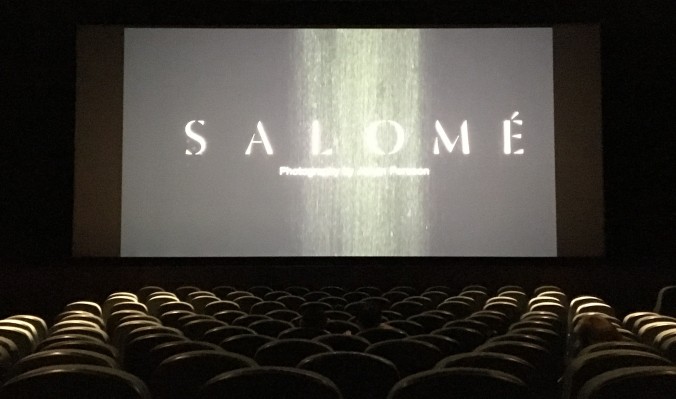
Here is more evidence that my viewing choices are not mainstream… Above is the “crowd” just before the same-day “as live” broadcast of Yaël Farber’s Salomé, part of the National Theatre Live project. In fact several of the people who did show up to see it walked out before it was over and I can’t say I blame them.
A quick review before going into detail… I found the play overly theatrical, using narration instead of dialogue for quite a bit of it. There were a lot of things that were distracting to the viewer, with not a lot a lot of substance to sustain interest, despite good intentions. On the other hand, the singing was beautiful and haunting. The expressiveness of the faces of Isabella Nefar (Salomé so-called) and Paul Chahidi (Herod, Client King) in conveying strong emotion was very well done. However, Salomé would definitely not be a play I would see a second time. Details follow and contain spoilers.
The production opens with Farber’s signature billowing fog, which is present throughout, as are the out-of-scene actors moving slowly around the stage. This not being a 4-D cinema, we thankfully couldn’t smell the incense which I understand was present in the theatre. The stage set is quite minimalist, as are most of the costumes, allowing the audience to focus on the actors. (Having the guards carry machine guns is a rather a strange and distracting choice, though.) A wonderful addition to the atmosphere is the unique background vocalizing of the Women of Song, Yasmin Levy from Jerusalem and Ubana Al Quntar from Syria. The cast is in fact purposely multicultural and multi-lingual, and many hail from countries that have experienced occupation and colonization.
Farber retells the story of Salomé as that of a woman pushed to stand up for sovereignty of her body and her country, by demanding the head of John the Baptist and so igniting the populous and changing history. Like previous versions of this story, though, it is still historical fiction even if slanted towards imagining a strong politically astute young woman, rather than the temptress she is usually written as. Although the former is Farber’s goal, what primarily comes across is a young woman sexually used/abused by her stepfather/uncle and various occupiers of her country, who finally snaps and takes revenge. I’m not sure that there is any evidence that this story is any more true than the others.
 The play is narrated by Salomé as an older woman (ghost?) played by Olwen Fouéré. I found her delivery overly theatrical, but I think that is probably deliberate and intended to give a more classical feel to the play. I think the play would actually be more compelling, though, if we could see and listen to the dialogue as the drama unfolds. That being said, Isabella Nefar (Salomé so-called) conveys so much anguish through her facial expressions alone that dialogue is almost unnecessary. The other standout performer is Paul Chahidi as Herod, Client King. There is no doubt that he covets his stepdaughter/niece, and his lecherous gazes are disturbing in their realism.
The play is narrated by Salomé as an older woman (ghost?) played by Olwen Fouéré. I found her delivery overly theatrical, but I think that is probably deliberate and intended to give a more classical feel to the play. I think the play would actually be more compelling, though, if we could see and listen to the dialogue as the drama unfolds. That being said, Isabella Nefar (Salomé so-called) conveys so much anguish through her facial expressions alone that dialogue is almost unnecessary. The other standout performer is Paul Chahidi as Herod, Client King. There is no doubt that he covets his stepdaughter/niece, and his lecherous gazes are disturbing in their realism.
The dialogue is partly in English and partly in Hebrew (I assume) with subtitles on the screen. (I’m curious how they did the subtitles in the actual theatre, so please let me know if you saw it live.) It’s an interesting idea to emphasize difference in peoples through use of diverse languages, but I personally find it distracting. The choice to have the oppressors be the ones to speak English, rather having the oppressed do so, is presumably intended to make the audience identify as and contemplate being historical oppressors.
 There really isn’t enough action or dialogue to make the play something you want to see through to the end, which is likely why several people walked out before the broadcast was over. Ramzi Choukair as John the Baptist is very good, but is mostly just acting an out-of-control zealot rather than a fully formed character (since he is speaking a language we don’t understand and speaking at people rather than with them). And I found him being naked but for a loin cloth to be somewhat distracting (Is he cold? How does he keep that thing on? etc.). As is the nakedness of Salomé (in the darkness so it is only presumed) just before she dresses for the dance.
There really isn’t enough action or dialogue to make the play something you want to see through to the end, which is likely why several people walked out before the broadcast was over. Ramzi Choukair as John the Baptist is very good, but is mostly just acting an out-of-control zealot rather than a fully formed character (since he is speaking a language we don’t understand and speaking at people rather than with them). And I found him being naked but for a loin cloth to be somewhat distracting (Is he cold? How does he keep that thing on? etc.). As is the nakedness of Salomé (in the darkness so it is only presumed) just before she dresses for the dance.
The dance itself is not what I expected, given that she seems to be holding floor-to-ceiling curtains (seen below), rather than veils, and writhing more than dancing. The whole scene is a bit of a let down and doesn’t seem to be worth waiting for. I did, however, really like that the dinner at which she danced became a tableau reminiscent of Da Vinci’s The Last Supper. Very cool. And everyone there was speaking their same refrains used throughout the play over top of each other, creating an interesting cacophony.
 Farber seems to have a thing with her actors washing in basins or troughs, sometimes with water and sometimes with sand. The former was of course necessary for John the Baptist. The latter was particularly effective when Salomé was cleansing herself after being abused.
Farber seems to have a thing with her actors washing in basins or troughs, sometimes with water and sometimes with sand. The former was of course necessary for John the Baptist. The latter was particularly effective when Salomé was cleansing herself after being abused.
While there are some worthwhile aspects of the play, I think there are problems structurally and with the script. And what I didn’t like about the acting and the pretentious theatricality were, I suppose, related to the directing. To me, this doesn’t bode well for Oedipus to Antigone.
If you want to check out Salomé for yourself, there will be an encore broadcast at selected cinemas on July 15. The National Theatre also has a “Backstage” app with in-app purchases. I bought the Salomé digital programme for $3.99. It’s put together well, with background information on the history and the source material, as well as videos, photos and cast information.
Next Theatre at the Movies for me will be The Crucible on July 2.


Thanks for your thoughts about the play! Last week I read an opinion from someone who saw it live in London and her impression was similar to yours so yes I am not overly optimistic about Oedipus at this point too
LikeLike
I didn’t read any reviews before I went, so I wasn’t sure what to expect. I do hope Oedipus is better.
LikeLike
From what I heard about Salomé, one of the problems of the play is the text – which was conceived by Farber herself. She obviously will be tinkering with Oedipus to Antigone, too, since it is billed as a new adaptation, and that makes me feel apprehensive… It surprises me, in any case, that she is putting on another classical theme so soon.
So far I have seen two Farber productions, Crucible and Les Blancs, and I liked both of them. However, I have the suspicion that Farber has certain hallmark ‘ingredients’ in her plays – which were cool once or twice. But the incense, the humming soundscape and the women walking the stage perimeter kind of get old when it happens every time… After reading your review, I feel almost glad in hindsight that Salomé was not on when I was in London a few weeks ago…
LikeLike
Yes, a lot of the language used was very overblown. And the effects reminded me of the Crucible, and as you say they were cool the first time. After enjoying The Crucible (digitally), I was disappointed by Salome.
LikeLiked by 2 people
They’re showing Salome in Winnipeg that day. Personally, I don’t like Salome or both Greek plays. (I hated, hated, hated teaching Antigone.) No word on The Crucible so have fun. 🙂
LikeLike
I wonder why they would choose Salome for broadcast? They must have chosen before the reviews came out, I guess. Too bad The Crucible isn’t coming to Winnipeg. I’m looking forward to seeing it on the big screen.
LikeLiked by 1 person
I’ve recently discovered that there is an area theater (40 mi away) that is showing the NT Live events, but this one won’t be shown until the end of October. I will probably go see it. I have heard and read the most wildly diverging things about it, including someone I trust who went to see it in London and loved it. My favorite comment was in a review in a UK Jewish outlet that said, essentially, I can’t give it three stars because that would be a recommendation that you see it, but it’s provocative enough and sufficiently relevant to Judaism that I feel like it should be seen. Made me laugh.
LikeLike
I wonder if it might have been better live, being immersed in the experience? It wasn’t what I expected, but some of it was quite well done. In terms of the languages used, I couldn’t find anything that said what the non-English languages are. Today, though, I saw something that said that John the Baptist is speaking Arabic, while some of the other characters are speaking Hebrew. I’m surprised that some discussion of language isn’t in the digital programme.
LikeLiked by 1 person
Oh: and — the producer, Marianne Elliott, has “Angels in America” on in London at the moment and that is also going to be shown via NT Live. I might check that one out too, later in July. At least the first half. I haven’t seen it, only read it; it’s a weird play but people seem to love it.
LikeLike
It looks interesting from what I’ve seen. Funnily enough, it’s also live on stage in Vancouver this summer.
LikeLike
There was / is a NYC revival this year, I think, too. Maybe an anniversary of some kind. A lot of people are remembering the AIDS crisis right now.
LikeLiked by 1 person
Ahh. That would explain it.
LikeLiked by 1 person